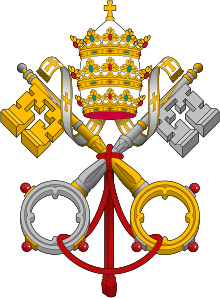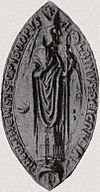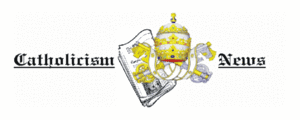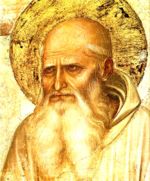
Back بوابة:الكنيسة الرومانية الكاثوليكية Arabic Уикипедия:Светци Bulgarian Portalo:Katolika Eklezio Esperanto Portal:Iglesia católica Spanish Portail:Catholicisme French Portál:Katolicizmus Hungarian Portale:Cattolicesimo Italian Portal:Katolik Malay Portal:Den katolske kirke NB Portal:Katolicyzm Polish
Introduction The Catholic Church, also known as the Roman Catholic Church, is the largest Christian church, with 1.28 to 1.39 billion baptized Catholics worldwide as of 2024. It is among the world's oldest and largest international institutions, and has played a prominent role in the history and development of Western civilization. The church consists of 24 sui iuris churches, including the Latin Church and 23 Eastern Catholic Churches, which comprise almost 3,500 dioceses and eparchies located around the world. The pope, who is the bishop of Rome, is the chief pastor of the church. The Diocese of Rome, known as the Holy See, is the central governing authority of the church. The administrative body of the Holy See, the Roman Curia, has its principal offices in Vatican City, a small independent city-state and enclave within the Italian capital city of Rome, of which the pope is head of state. The core beliefs of Catholicism are found in the Nicene Creed. The Catholic Church teaches that it is the one, holy, catholic and apostolic church founded by Jesus Christ in his Great Commission, that its bishops are the successors of Christ's apostles, and that the pope is the successor to Saint Peter, upon whom primacy was conferred by Jesus Christ. It maintains that it practises the original Christian faith taught by the apostles, preserving the faith infallibly through scripture and sacred tradition as authentically interpreted through the magisterium of the church. The Roman Rite and others of the Latin Church, the Eastern Catholic liturgies, and institutes such as mendicant orders, enclosed monastic orders and third orders reflect a variety of theological and spiritual emphases in the church. Of its seven sacraments, the Eucharist is the principal one, celebrated liturgically in the Mass. The church teaches that through consecration by a priest, the sacrificial bread and wine become the body and blood of Christ. The Virgin Mary is venerated as the Perpetual Virgin, Mother of God, and Queen of Heaven; she is honoured in dogmas and devotions. Catholic social teaching emphasizes voluntary support for the sick, the poor, and the afflicted through the corporal and spiritual works of mercy. The Catholic Church operates tens of thousands of Catholic schools, universities and colleges, hospitals, and orphanages around the world, and is the largest non-government provider of education and health care in the world. Among its other social services are numerous charitable and humanitarian organizations. (Full article...) Selected article
 A papal conclave is a meeting of the College of Cardinals to elect the Pope of the Roman Catholic Church (or Bishop of Rome) who is considered by Catholics to be the Successor of Saint Peter and head of the Church. A history of political interference in these elections and consequently long vacancies between popes, and most immediately the interregnum of 1268-1271, prompted the Second Council of Lyons which decreed in 1274 that the electors should be locked in seclusion cum clave (Latin for "with a key"), and not permitted to leave until a new Bishop of Rome is elected. Conclaves are now held in the Sistine Chapel in the Palace of the Vatican. In the early centuries of Christianity the bishop of Rome (like other bishops) was chosen by the consensus of the clergy and people of Rome. The body of electors was more precisely defined when, in 1059, the College of Cardinals was designated the sole body of electors. Since then other details of the process have developed. In 1970 Pope Paul VI limited the electors to cardinals under 80 years of age.
Selected image
 Credit: Afernand74 Intercession of Charles Borromeo supported by the Virgin Mary (1714), ceiling fresco by Johann Michael Rottmayr (1654-1730) in the Karlskirche, Vienna. The son of Giberto II Borromeo, conte (count) of Arona, and Margherita de' Medici, Carlo Borromeo was born at the castle of Arona on Lago Maggiore. The aristocratic Borromeo family's coat of arms included the Borromean rings, sometimes taken to symbolize the Holy Trinity. Selected biography
 Albin (or Albinus) (d. 1269) was a 13th-century prelate of the Kingdom of Scotland. A university graduate, Albin is known for his ecclesiastical career in the diocese of Brechin, centred on Angus in east-central Scotland. Almost certainly a native of Angus, he appears to be a descendant of David of Scotland, Earl of Huntingdon, brother of King William I of Scotland, through an illegitimate son whom Earl David settled in the area around Brechin. Albin, himself an illegitimate child, made his career as a churchman in the local diocese, and served for some time as precentor of Brechin Cathedral before, in 1246, being elected Bishop of Brechin. He remained Bishop of Brechin until his death in 1269. Albin became Bishop of Brechin following an election and then a successful appeal for confirmation to the papacy. Pope Innocent IV's mandate for confirmation gave the details of the election.
Did you know...
Related portalsFeast Day of June 19
Selected quote

News
SubcategoriesTopics
The Holy Bible:
Particular Churches (grouped by liturgical rite):
Things you can do
External resourcesWikiProjectsAssociated WikimediaThe following Wikimedia Foundation sister projects provide more on this subject:
Discover Wikipedia using portals |
© MMXXIII Rich X Search. We shall prevail. All rights reserved. Rich X Search
































